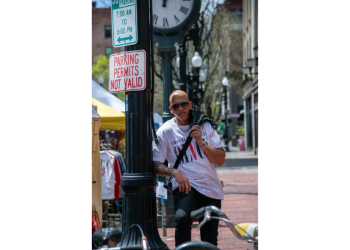Republicans have said the ads are part of a broader strategy of calling out Democrats on crime, an argument they believe will be potent in the closing stage of this year’s midterm elections. But some allies of Barnes, who would be Wisconsin’s first Black senator, have derided the attacks as racist messages that feed on stereotypes. As he faces a torrent of negative ads, Barnes has launched spots seeking to assure voters he will fight crime and support law enforcement. Yet some Democrats said they fear his response has been ineffective.
The tensions playing out in Wisconsin mark one of the starkest examples of a trend that has swept across the midterm landscape with about six weeks left until Election Day: Republicans are increasingly centering their pitch to voters on crime, casting Democrats as weak and ineffective buffers against violent criminal conduct. As Republicans advance that argument, they are drawing growing accusations from Democrats that they are engaging in a pattern of stoking racial divisions, a charge they reject.
At the same time, Democrats worry the attacks could resonate amid the rise in violent crime that has taken place with their party in power at the federal level and in many cities. Some candidates are scrambling to distance themselves from slogans such as “Defund the police” that were popular among left-wing activists after a reckoning on racial justice and policing two years ago but have complicated the party’s image more broadly since that time, according to strategists across the political spectrum.
Homicide rates in the country’s cities have spiked over the past two years, with officials pointing to pandemic-related changes to the criminal justice system and, in some cases, less stringent policing policies. Now, from the Senate battlegrounds of Wisconsin and Pennsylvania to key House races across the Midwest and beyond, Republicans are ramping up attacks highlighting incidents of deadly violence, sometimes in grisly detail, in ads and speeches.
“I have been trying to be quiet about it for a long time because I would hate for the Democrats to figure it out, but I think the cat, it’s out of the bag,” said Curt Anderson, a top strategist for National Republican Senatorial Committee Chairman Rick Scott (R-Fla.) “For the last eight or nine months I could just see it [crime] coming as the worst issue for the party in power.” He signaled that Republicans would attempt to hit on the issue more sharply in Georgia, where there is another battleground Senate race.
The rationale for the strategy is apparent in public polling. Republicans have a 22-point advantage on handling crime, with 56 percent of registered voters saying they trust Republicans more while 34 percent say they trust Democrats more on the issue, according to a new Washington Post-ABC News poll.
Just as Democrats have put many Republicans on defense over abortion in the wake of the Supreme Court decision to reverse Roe v. Wade, the GOP is now seeking to go on offense over crime. After spending much of this election cycle with a clear advantage in the midterms, the GOP appeared to lose some ground over the summer in the battle for Congress, and party strategists hope running on crime will help them regain their footing in the final weeks.
During the first three weeks of September, the Republican candidates and allies aired about 53,000 commercials on crime, according to AdImpact, which tracks political spots on network TV. That’s up from the 29,000 crime ads they aired in all of August. Nearly 50 percent of all Republican online ads in battleground states have focused on policing and safety since the start of the month, according to data from Priorities USA, a group focused on electing Democrats.
The Republican messaging often seeks to tie Democratic candidates to calls to defund the police and abolish U.S. Immigration and Customs Enforcement, even as most nominees do not subscribe to those views. In other cases, Republicans single out policies promoted more directly by Democratic candidates, including limiting or redirecting police funding and changing the way bail regulations work.
One ad from the Congressional Leadership Fund, a super PAC aligned with the House GOP leadership, asserts that Democratic candidate Liz Mathis, running in Iowa’s 2nd Congressional District, is “not an ordinary Democrat” and associates her with the defund-the-police movement, saying she once marched with a group that supports the cause and employed a campaign staff member who has backed it.
In an interview, Mathis said she anticipated the attacks that she’s soft on crime even though she has voted repeatedly to increase funding for law enforcement, and prerecorded a rebuttal advertisement that features two local sheriffs vouching for her and rejecting calls to defund the police. The ad went up the day after the attacks began, she said.
In the Senate race in Florida, incumbent Marco Rubio (R) launched ads featuring local law enforcement officers who claim that his opponent, Rep. Val Demings (D-Fla.), “turned her back on law enforcement.” Before she was elected to Congress, Demings served as chief of the Orlando Police Department.
She retorted with her own ads that highlight her nearly three decades working in the police force. “In the Senate, I’ll protect Florida from bad ideas like defunding the police. That’s just crazy,” Demings says in the spots.
While the crime attacks are not wholly new, to an extent, the GOP emphasis on the issue marks a reorientation of the party’s predominant midterm message beyond the economy and inflation. Rising costs remain part of the GOP pitch, but several Republican strategists noted that falling gas prices makes the issue less urgent and pointed to the topic of crime as highly effective, particularly in Wisconsin and Pennsylvania.
Republicans said they believe they can use the issue to motivate their base and persuade undecided and independent voters to cast ballots for GOP candidates. Some Democrats said they see a more sinister strategy reminiscent of past elections, involving racial stereotypes and playing on voters’ worst instincts.
In Wisconsin on Wednesday, a group of activists and lawmakers called on the GOP to remove its ads targeting Barnes on crime. “We’re out here standing up for the truth demanding that these divisive, racist ads be taken down,” said state Sen. Chris Larson (D), describing them as “a blatant attempt to gin up fear.”
Some of the ads, including from the Senate Leadership Fund super PAC, seek to connect Barnes’s authorship of a measure to end cash bail to the driver of a vehicle who killed six at Christmas parade in Waukesha. The man charged in that case had been released on a $1,000 bond before driving an SUV through the crowd. The trial in that case is set to begin in early October.
Barnes rejects the assertion that his plan would have freed the suspect, noting that his initiative would require judges to hold defendants if there is “a substantial risk” that the defendant could “cause serious bodily harm” to people in the community.
Cornell Belcher, who was a pollster for Barack Obama’s presidential campaigns and watched some of the ads against Barnes, said they play “in the continuum of the politics of victimization.”
“This is Willie Horton 2.0,” Belcher added, referring to a 1988 GOP ad intended to paint then-Democratic presidential nominee Michael Dukakis as soft on crime. It featured a Black man who was released from a Massachusetts prison on a furlough program and went on to rape a White woman.
When shown a different ad from the NRSC attacking Barnes that features his name scrawled in graffiti, Belcher, who is Black, was uncharacteristically at a loss for words. “The imagery of that ad to me is just as important as the words in that ad,” Belcher said. “They’re attempting to ghettoize him.”
Chris Hartline, a spokesman for the NRSC, rejected that the advertisements play on racial tropes. “Crime destroys all people, regardless of race,” Hartline said in a statement. “And Mandela Barnes has supported a radical, soft-on-crime agenda.”
The crime ads, and other attacks against Barnes, ramped up in the end of August. As they’ve hit the airwaves, the share of voters with an unfavorable impression of Barnes has risen, according to polling from Marquette Law School.
Charles Franklin, director of the Marquette Law School poll, said the ads against Barnes have come “fast and furious” and have probably contributed to the worsening of his numbers.
In a statement, Barnes spokeswoman Maddy McDaniel said Sen. Ron Johnson, the GOP incumbent, and his allies “have resorted to lying” about Barnes’s record. She characterized the Republican ads as “desperate attacks and outright lies.”
Barnes has tried to counter some of the GOP ads more directly with his own commercials. He recently released one that features a retired law enforcement officer vouching for him. In another, Barnes stands in a kitchen unloading groceries and says Republicans are lying when they say he wants to “Defund the Police” and “Abolish ICE.”
Barnes was once photographed posing with a red T-shirt emblazoned with the phrase “Abolish ICE” and subsequently distanced himself from the slogan. In the past he has suggested using money from what he called “over-bloated budgets in police departments” to pay for neighborhood services, though his campaign maintains he does not support defunding the police.
Still, some Democrats with ties to the state said privately that Barnes should have been more prepared for the attacks and criticized him for repeating the words “defund the police” and “abolish ICE.” One Wisconsin Democratic operative who spoke on the condition of anonymity to more candidly discuss the race called the latter a “baffling choice.”
In Pennsylvania, Republicans have also turned their focus to crime in the Senate race — portraying Democratic nominee John Fetterman as “dangerously liberal on crime.” Republican Senate nominee Mehmet Oz has called on Fetterman to fire two brothers working on his campaign who were convicted of murder and later released.
“There’s a racial component here. It’s even less than dog whistling, it’s a horn,” said Joe Calvello, a spokesman for the Fetterman campaign, responding to the attacks Fetterman has faced.
The brothers, Dennis and Lee Horton, are Black. Fetterman invited the brothers to stand with him at a rally in Northwest Philadelphia on Saturday. Fetterman said he knew his advocacy for them would be used to attack him in future elections but that “I would never trade a title for my conscience.”
The choice in this election, Fetterman told supporters Saturday, is someone who will “fight to make sure innocent men will die in prison versus a man who will fight to make sure they can get back with their families.”
Fetterman has also aired an ad in which he says Oz “would not last two hours” in the town of Braddock, Pa., where Fetterman oversaw a drop in murders as mayor. In the spot, Fetterman shows how he tattooed the dates of homicides on his forearm to keep himself focused on the issue.
Republicans have defended Oz’s strategy and argued that it is helping him gain traction after he struggled over the summer. “People are increasingly concerned about their families’ safety,” said Charlie Gerow, a longtime Republican strategist who was a GOP candidate for governor this year. “I think the message has to be pretty straightforward: Support law enforcement that fully funds police and a system that enforces the law, while Democrats have more empathy for perpetrators than victims.”
Democrats have long seen crime as a political vulnerability and have sought to protect themselves against attacks. In his State of the Union address, President Biden stressed his support for police. Biden has also touted money from the American Rescue Plan he signed that can fund police departments. And the president has touted a gun-control law as evidence of the party’s commitment to fighting violent crime.
New Mexico Gov. Michelle Lujan Grisham (D) proposed law enforcement pay increases of roughly 20 percent, and Wisconsin Gov. Tony Evers (D) sent tens of millions in new funding for various police efforts.
Former president Donald Trump has leaned heavily into the issue of crime, calling for drug dealers to face the death penalty and describing violent offenses in vivid detail. “Right here in Ohio, our once-great cities are now scenes of horror riddled with bullet holes and soaked in blood,” Trump said at a recent rally in Youngstown, Ohio.
Republicans, including Trump, are also increasingly seeking to connect crime with their immigration message, making the argument that lax security at the southern border is a threat to national security and also fuels the illicit drug trade. “It is a natural fit and is out there quite a bit and will happen more,” said Anderson, the GOP strategist.
Itkowitz reported from Philadelphia. Hannah Knowles in Youngstown, Ohio, and Emily Guskin in Washington contributed to this report.























